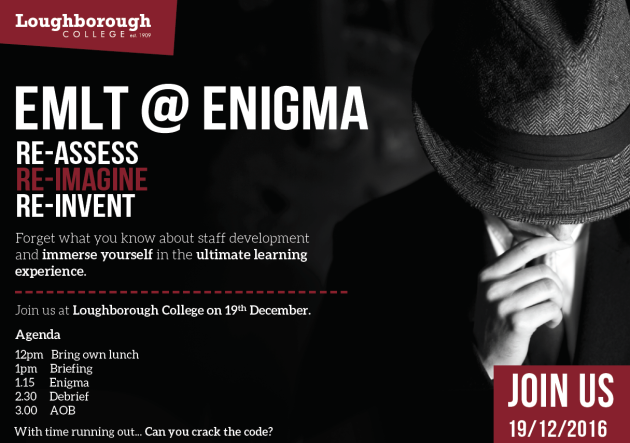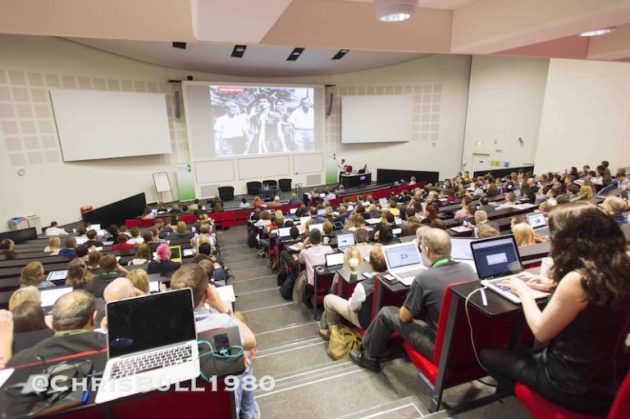The Late Summer EMLT meeting took place on Wednesday 24 August at the University of Nottingham. We would like to extend our thanks to the Health E-Learning and Media Team (HELM) for hosting the event, and to Kirstie Coolin – E-Learning and Media Manager of HELM who organised the event. And thanks to all of you who attended on a rather hot and sticky afternoon.
Based on feedback from the previous meeting we decided to go with NO THEME for this session – to afford an opportunity to those who had things they wanted to share and discuss in general.
The plan is to continue with this open themed approach for the time being – until the time comes where a situation arises where it would be timely or pertinent to focus on a particular theme.
Presentations
Richard Windle
Title: Higher Education Institution (HEI) Challenge
The HEI Challenge is an East Midlands initiative to develop healthcare education. Funded by Health Education East Midlands (HEEM) and East Midlands Academic Health Science Network (EMAHSN), the Challenge partners East Midlands’ Universities to share and develop the use of technology to develop new ways of working in education; such as high quality online content, educational games, electronic portfolios and personal development plans, and social networking for patient-patient, clinician-patient or clinician-clinician communication and interaction.
Richard showcased TRI-IT (Technology related innovation – implementation tool), an interactive online resource developed by HELM as part of the HEI challenge. TRI-IT facilitates the innovative deployment of technology in Health Care Education (it could also be used in other areas of the curriculum). Drawing on shared experiences and input from the HEI challenge partners, the resource maps the learning journey within health care education using a hub and spoke model. Each key stage in the journey is an interactive hub/node in the model which can be expanded to reveal the potential technology facilitated approaches which can be used. This information is further underpinned by real life case studies.
The resource is intended to support teachers in the use of digital technology in the curriculum and also to support continued professional development in areas of digital literacy.
Although currently still in pilot phase TRI-IT is accessible online at: http://www.nottingham.ac.uk/helmopen/tri-it/
The second half of Richard’s presentation consisted of an activity workshop wherein we were split into groups and used the online resource to complete an E-Learning Activity Planner. At the end of the session each group shared the results of their planning activity.
Presentation slides (.pptx)
Mike Taylor
Title: MOVA – Managing Violence and Aggression
Mike’s case study articulated the challenge of designing and developing a number of field specific open e-learning resources – based around video scenarios – to promote best practice for Student Nurses, Midwifes, Physiotherapists and Health Care Workers when confronted with violence and aggression in the workplace.
To facilitate the production of the videos a community of practice was established; indeed the finished product serves as a testimony to what a well organised and motivated community of practice can achieve.
Materials were developed in workshop sessions. The videos were filmed by the learning technologists (which was itself quite a challenge) with academic staff on hand to advise on the practice elements. The draft videos were then shared online to get feedback from the wider community of practice before being finalised.
The final resource consisted of 18 videos!
The core challenge that emerged from this endeavour concerned the logistics of producing high quality videos (and 18 of them); having to take into account such things as sourcing actors, script writers, storyboard writers, equipment, locations, etc. Not only did this take significant organisational skills but also required financial backing. Mike was keen to stress how one should not underestimate the logistics of this type of video production.
Presentation slides (.pptx)
Chang Ge
Title: Improving Study Skills through Digital Literacy
Chang described how she used reflection on her own personal journey in technology facilitated education, towards the development of a study skills framework for students which was underpinned by a broader digital literacy – or as Chang described it – digital fluency.
Drawing on her experiences of teaching in FE where she encountered significant variability in students’ academic writing skills; and finding that similar issues were present when she moved into HE – Chang applied some of the interventions that she found effective in FE to HE, but further extending the range to include study skills in general.
Key to the development of the resource was her personal reflection on how she had arrived at her own state of digital fluency. Through mapping her own journey Chang was able to apply this towards the development of a student resource.
The online study skills resource is presented as seven key areas: Learning Strategies, referencing, reading skills, note taking skills, critical analytical skills, research skills, and academic writing skills.
Chang took a particular approach in that she chose to embed the study skills within her subject – the localised learning context – rather than delivering the study skills content as a standalone package, isolated from the curriculum. She noted that she found that there was some resistance to the idea of embedding study skills within the subject curriculum; and that the jury still appears to be out in terms of what the most appropriate approach should be.
Presentation slides (.pdf)
Angelique Bodart
Title: Appy Hour
Angelique gave an account of a session that she introduced for teaching staff at Nottingham University. She pointed out that credit for the idea should go to Nottingham Trent University who ran a similar session.
Appy Hour began as monthly event where three presenters showcase an app that they have used for teaching, learning or research purposes.
Angelique emphasised how she took a very particular targeted approach to how the event was marketed, as she was convinced that such an event would be of significant benefit to those who attended – but often the difficulty is getting teachers through the door. Describing the psychology of how she marketed the event she noted some key approaches. No pre-session information was given as to what apps would be presented – therefore staff couldn’t decide if they wanted to attend or not based on what was being shown. The sessions would not be recorded in any way – so you had to attend in order to engage. Learning technologist were not allowed to present – as the focus was to be on academic staff sharing their situated teaching experiences.
Not only did the session provide an opportunity for staff to find out how some of their colleagues were using particular technologies to support teaching and learning, it also provided time for staff to get out of the office and engage in some collegiate networking. As a result of this, broader discussions around the use of technology began to happen at the sessions. As such, over time the focus of the sessions broadened to include any useful apps – not just those for teaching or research. The sessions have proved so popular that there is now a waiting list for staff who want to come along to a session.
Presentation slides (.pptx)
Open discussion session
The floor was then opened up to discussion. Several topics were raised:
We began by expressing our thoughts about a presentation by John Traxler at this year’s JISC Digifest titled: What Killed the Mobile Learning Dream? Visit: (https://www.jisc.ac.uk/news/what-killed-the-mobile-learning-dream-26-feb-2016)
This discussion segued into issues around BYOD some of which had emerged from Angelique’s presentation. In particular, institutional policy for BYOD (for staff and students) and the challenges and barriers that such a policy might present.
A question was then raised about Classroom Response Technologies (i.e. voting clickers) for mobile devices, appropriate software for facilitating this approach to learning in the classroom, and the challenges and barriers concerning its use.
A final discussion was had based on a question about institutional policy with regards to the use of particular platforms – if any institutions represented ny those in attendance strictly prescribed what platforms staff could use. For example – if an institution used Office 365 were staff still allowed to use, for example Google Docs/Forms, etc. From the discussion that emerged it appeared that there were no such restrictions in place at those institutions represented by the group. But there was some concern raised that this could be a potential emerging direction of travel. A discussion was also had regarding the use of third party, cloud hosted platforms and the potential issues with these concerning data protection.
Next EMLT meeting
The next meeting will be our Winter session (December). We are in urgent need of someone to host the event. Please contact Rob (rweale@dmu.ac.uk) ASAP if you might be able to host.
🙂



 The Spring EMLT meeting took place on Wednesday 18 May at the University of Derby. We would like to extend our thanks to Derby for hosting the event, and to Claire Gardener – Senior Learning Technology Adviser at Derby who organised the event.
The Spring EMLT meeting took place on Wednesday 18 May at the University of Derby. We would like to extend our thanks to Derby for hosting the event, and to Claire Gardener – Senior Learning Technology Adviser at Derby who organised the event. Our Spring meeting of the East Midlands Learning Technologists’ group is due to take place on Wednesday 18th May at the University of Derby.
Our Spring meeting of the East Midlands Learning Technologists’ group is due to take place on Wednesday 18th May at the University of Derby.
